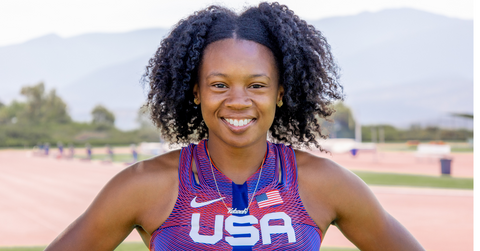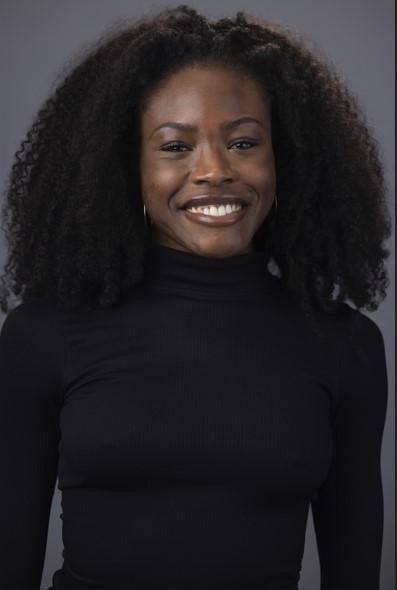Keturah Orji is a 2x Olympian and 10x US Champion track and field athlete. She’s the first American since 1974 to win six consecutive US titles in the outdoor triple jump and became the first American woman in history to qualify for two consecutive Olympic finals in the triple jump at the 2021 Olympic Games. Keturah is also an admirable advocate for equality and expanding access to opportunities for women of color.
Her Agenda spoke with Keturah about her expectations for the June 2024 Olympic Trials, her efforts towards educating her peers on financial literacy, and her plans for retirement after this year’s Summer Olympic Games.
Her Agenda: So, you’re coming off your 10th overall national triple jump title [that] you recently won at this year’s USA indoor track and field championships. How does that feel to be a 10-time champion?
Keturah Orji: It’s really exciting. I often say that I feel like the more championships I win, the more grateful I am. I think the older I’ve gotten, the more I realized how difficult it is to remain at a high level, compete well, [and] stay injury-free. There are so many aspects to track and field that I didn’t know when I was younger, so I would say [after] each national title, I am more grateful to really feel the weight of what it is that I’m doing in the sport. It’s not easy to stay at an elite level time and time again on a certain championship day. So, I’m really grateful to have been able to do this.

Her Agenda: When did you start competing?
Keturah Orji: I started track my freshman year of high school [at] 14 years old. Some people start when they’re little kids, but I was a gymnast at first. When I quit gymnastics after eighth grade, I knew I was fast just from recess. I always would race boys or play tag with boys [and] I was one of the fastest. So, I was like, okay, let me try sprinting. I started out running my freshman year of high school, and then I started triple jumping my sophomore year of high school.
Her Agenda: Yeah, [we] saw that gymnastics was what you wanted to be the [sport] that led you to the Olympics, and now it ends up being track and field. Having to switch your dream a little bit, what was navigating that like, and how have you seen the positive effects of switching sports?
Keturah Orji: I will say that I wasn’t super tied to the gymnastics track. It was more that was the sport that I did, and I was excelling in [it]. When you’re a gymnast, the biggest goal is going to the Olympics. So, I was like, okay, that was my goal. People would always say, like, ‘You’re really good at this, you can go to the Olympics,’ things like that. My mindset was more around gymnastics because that’s what I was doing. When I decided to do track, the goal wasn’t really the Olympics because I wasn’t sure how good I was. With track, there are a lot of different avenues, so the focus wasn’t [on] going to the Olympics. As I got better and better, I realized I had done gymnastics [and] I thought I could go to the Olympics. I stopped doing gymnastics, but now I can [have] that same goal and accomplish that same milestone within a different sport.
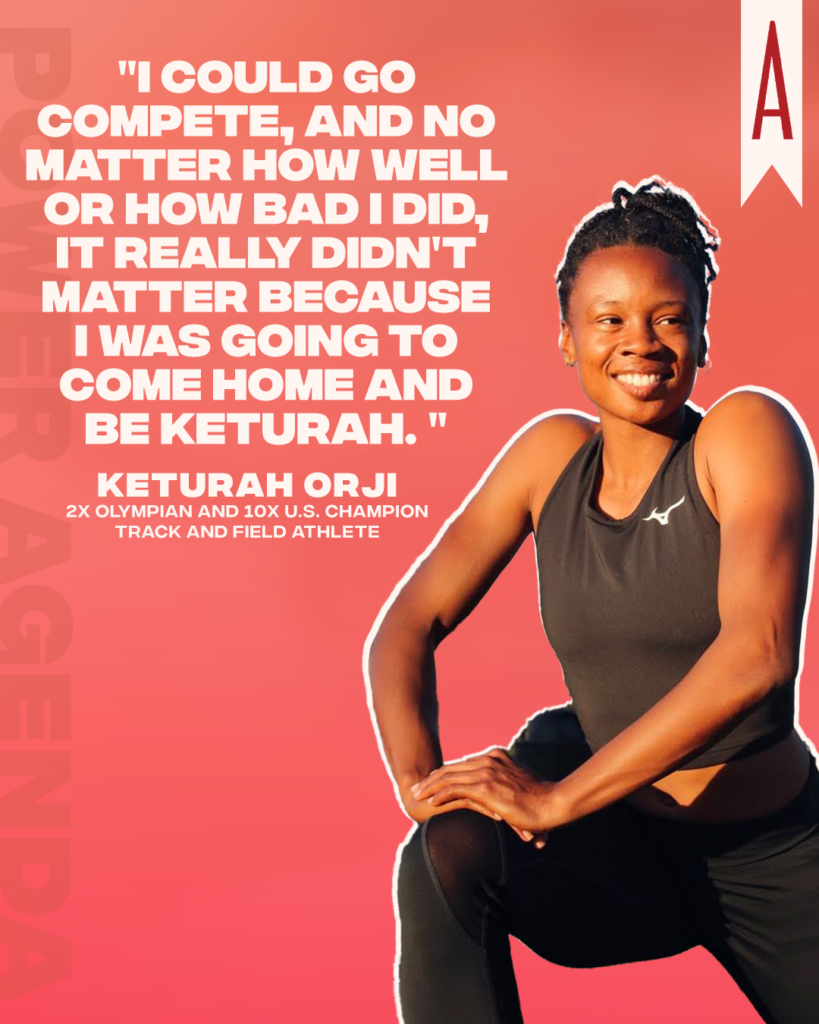
Her Agenda: You have the Olympic trials coming up, and the Olympics this summer. Can you walk [us] through a typical week of training for you?
Keturah Orji: I lift three times a week currently, so that’s Monday, Tuesday, [and] Thursday. I usually wake up around 8:30-ish [or] 9 [am] and go lift [weights]. That usually takes an hour [or] an hour and a half, and then I have the afternoon to myself. My coach has a full-time job, so we practice at 6 p.m. [and], which usually is six to 9 pm-ish.
Wednesday and Friday are recovery days [and] I have a circuit on my own. I go to the gym, bike, do some circuits, and then [I] usually do the sauna because I feel like that helps me recover a lot.
Saturday, we have practice but no lifting. Usually, 11:00 [am] to 2 pm is a training practice [and] I’m referring to track-specific or jump-specific workouts. And then, Sunday’s completely off.
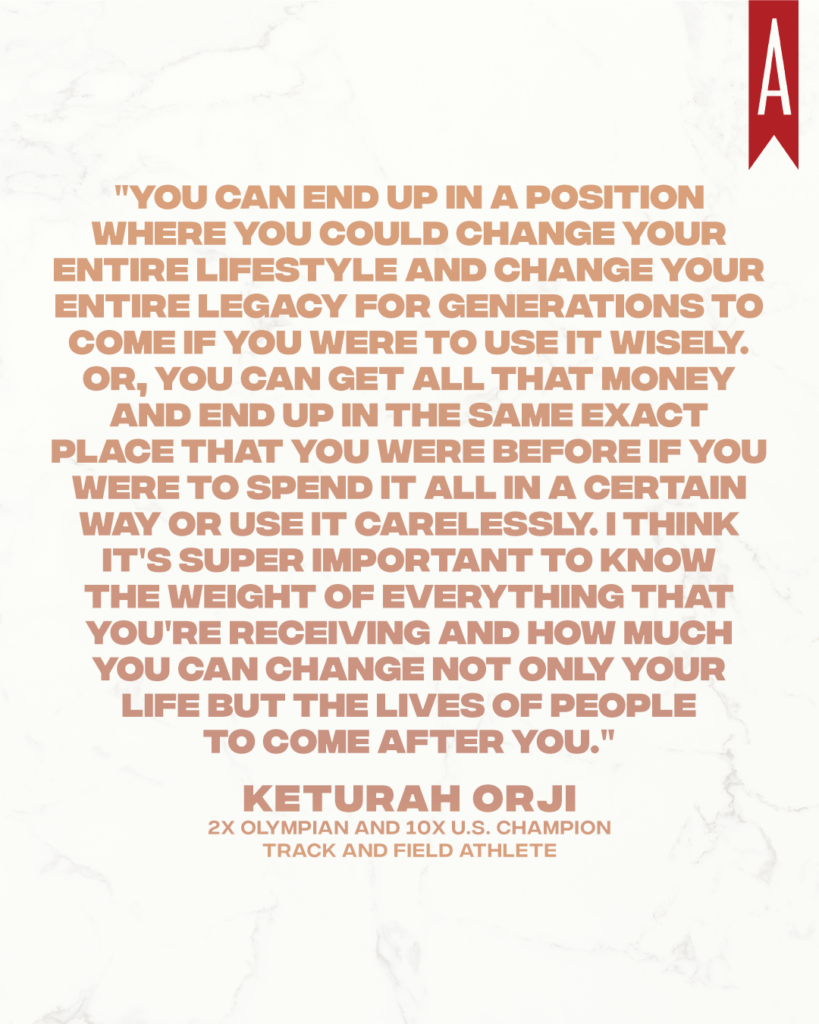
Her Agenda: What do those rest days look like and feel like for you, and what do you try to accomplish on those rest and recovery days?
Keturah Orji: It really just depends on what my body’s feeling and just trying to listen to what my body’s telling me. Like I said [earlier], the sauna’s always something consistent [that] I always do. But, if I’ve been feeling beat up, I may go to physical therapy and get some treatment there. I also have some recovery boots that I have at home that I could use. I have a cupping set that may cup my body. So, it’s really just about listening to my body and seeing what is hurting me today? What is it that I can help so that I can feel better for my next practice and still be able to practice at a high level? Also, [I] always [prioritize] sleep. It’s not really something that’s specific to recovery days, but making sure I can try to get seven to eight hours of sleep each night is super important. I know that people talk about all the different tools for recovery, but to me, sleep is the number one thing. If I get a good night’s rest, I can tell my body has taken care of itself. The cupping and the boots [are] nice. But I feel like my body almost [recovers] on its own when I get a good night’s rest. That’s really what I prioritize each night.
Her Agenda: The Olympic trials [are at the] end of this month. What are you most excited about this time around as you prepare?
Keturah Orji: My focus is to really just be present, knowing that this will be my last Olympic trials and one of my last competitions ever since I’m going to retire after this year. I would say I just really want to focus on being present. [In] other years, like 2016, I was very nervous. It was my first Olympic trials and [I was] just very future-oriented. Tokyo year (2020) was a weird year because of Covid and, sometimes, you were going to meets and there weren’t [any] spectators. But again, [I was] very future-oriented. What can I do at the Olympics, how am I going to do [during] the rest of my week? For these Olympic trials, I really just want to be present and sit in on everything I’ve been able to accomplish. I’ve been able to win both Olympic trials that I went to, so it would be amazing to be able to cap off my career by winning a third Olympic trial and just be present with everything I have been able to accomplish. I really just want to be appreciative of everything I’ve been able to accomplish, and regardless of results, just really enjoy the moment.
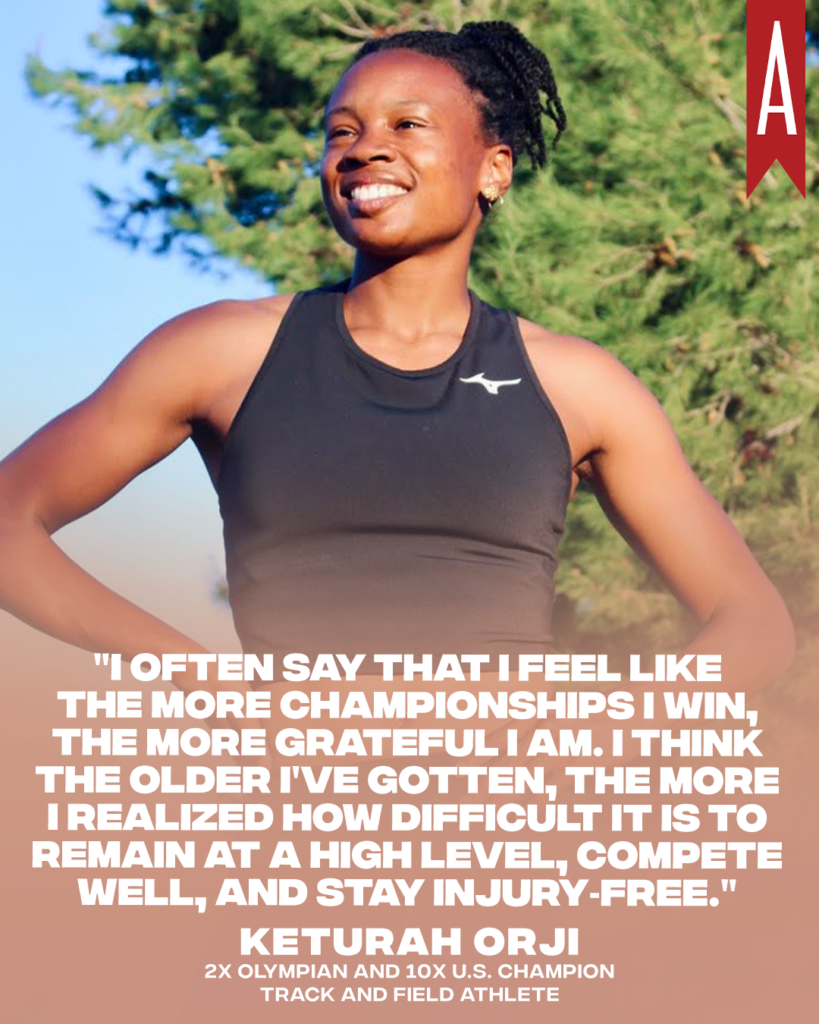
Her Agenda:That’s beautiful, remaining present. [Let’s] shift gears a little bit and talk about you being a financial coach. You studied financial planning in college [but] what kept you interested in finance [enough] to grow it into a business of your own?
Keturah Orji: It all started with the knowledge I was able to gain with my degree and the classes I was taking in college. Growing up, I felt like the only thing I knew about money was saving. It’s really important to save your money. Don’t spend too much, don’t get into debt. But then I started taking wealth management classes, retirement planning, [and] estate planning [classes], and I [found] out all these different tools and resources. And I was like, I wish I knew this before, and everyone needs to know this. Even realizing that there were some things I learned that my parents didn’t know and the people I looked up to didn’t know. I think seeing that gap in education, especially in communities of color or minorities, I really wanted to tell everyone about what I learned.
As I continued to learn and continued to talk to people about the different things, I realized how many people needed help with it. How many people had questions about it? How many people maybe didn’t feel like they knew someone who could explain these things to them, or understood it well enough, or guide them? And so when I started my business, it really wasn’t like, oh, I want to become a top business and make a bunch of money. It was just to create a structure. I had so many friends and their friends saying, ‘Hey, can you help me with this? Can you teach me this? Can you talk about this?’ And so I just want to create some structure around [sending] people to [my] website, I’ll have my availability there. I can create some structure on helping people and making sure that they have someone that looks like them, that they can trust, [and] that’s around the same age as them. The financial planning industry is predominantly white, it is predominantly male, and being a Black woman of color opens up space for people to be able to feel comfortable asking [me] questions and feel like they can trust, understand, [and] be understood.
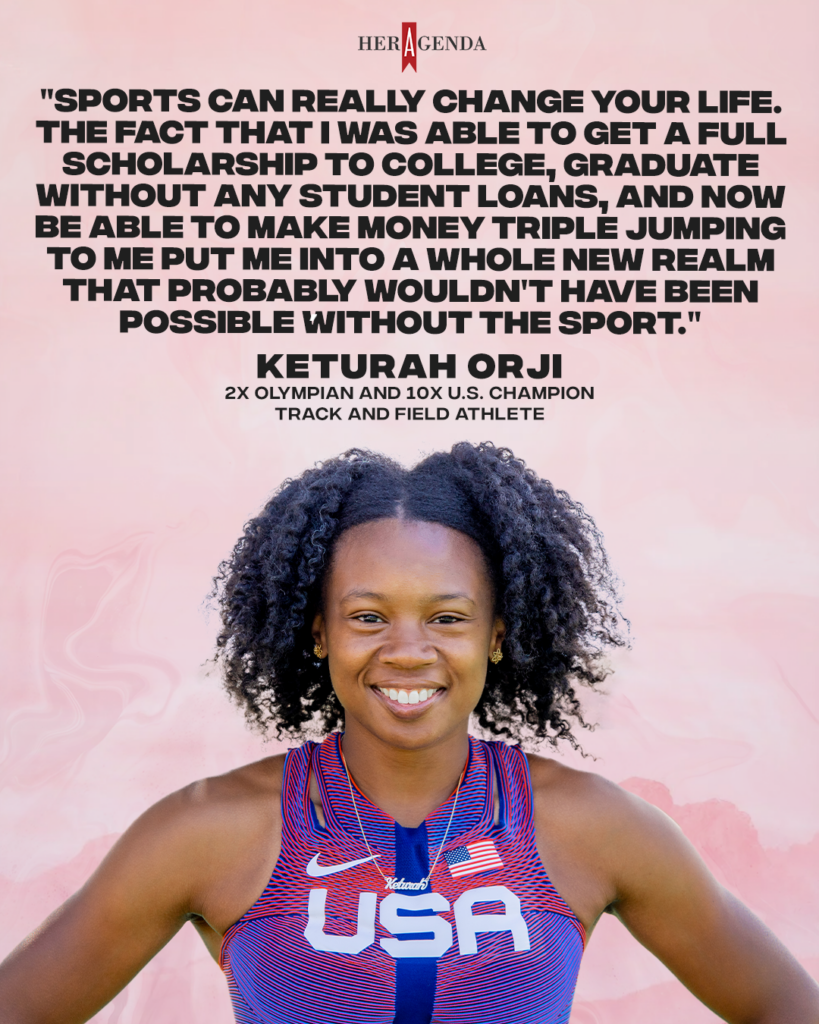
Her Agenda: What do you think keeps a lot of us, meaning folks of color, women, women of color, what do you think kind of keeps us from learning about a lot of the things that can help us with our finances?
Keturah Orji: It’s a lot of things. Growing up, a lot of our families didn’t have wealth. So if you’re growing up in a space where people are trying just to make ends meet and living paycheck to paycheck, you don’t really have time to think about investing in [a] 401K or starting up your IRA. [You’re] trying to pay the bills today. I also would say that culturally and in society, to me, it’s like a predominantly male thing to manage and understand finances and invest. That’s all a very male-dominated industry. Things have gotten more progressive, and it’s still very much a male-dominant thing. You don’t find groups of women talking about, ‘Hey, I’m investing in this. I saw this company, and they’re doing well, so I’m going to put my money here.’ It’s just not very often promoted in our culture. And I think it’s because growing up, you don’t see women doing those things. So you kind of assume like, Okay, I don’t need to do that. That’s not my space to do that; somebody else will handle it. [It] just comes with trying to normalize women talking about money, talking about budgeting and talking about what they’re investing in, or how they invest in different investment accounts they have and not be afraid to ask questions or make mistakes.
Even when I acquired all the knowledge in college, I was still very nervous about starting to invest. I’m very risk-averse. I think a lot of women are risk averse, and that kind of keeps us from trying to do some things that could really move the needle as far as wealth, and so it takes time, and it takes risk, but I will say that we just kind of need to encourage each other and make it normal to talk about those things. If you don’t know, that’s okay; you can ask, and you can research, especially with all the information that’s available online, so that we can eventually get to the place you need to be for that information.
Her Agenda: Why is it important for athletes, especially women athletes of color, to have a handle on how they manage their finances and have a handle on financial literacy for themselves?
Keturah Orji: I always say that sports can really change your life. The fact that I was able to get a full scholarship to college, graduate without any student loans, and now be able to make money triple jumping to me put me into a whole new realm that probably wouldn’t have been possible without [the] sport. It’s so important because you can end up in a position where you could change your entire lifestyle and change your entire legacy for generations to come if you were to use it wisely. Or, you can get all that money and end up in the same exact place that you were before if you were to spend it all in a certain way or use it carelessly. I think it’s super important to know the weight of everything that you’re receiving and how much you can change not only your life but the lives of people to come after you.
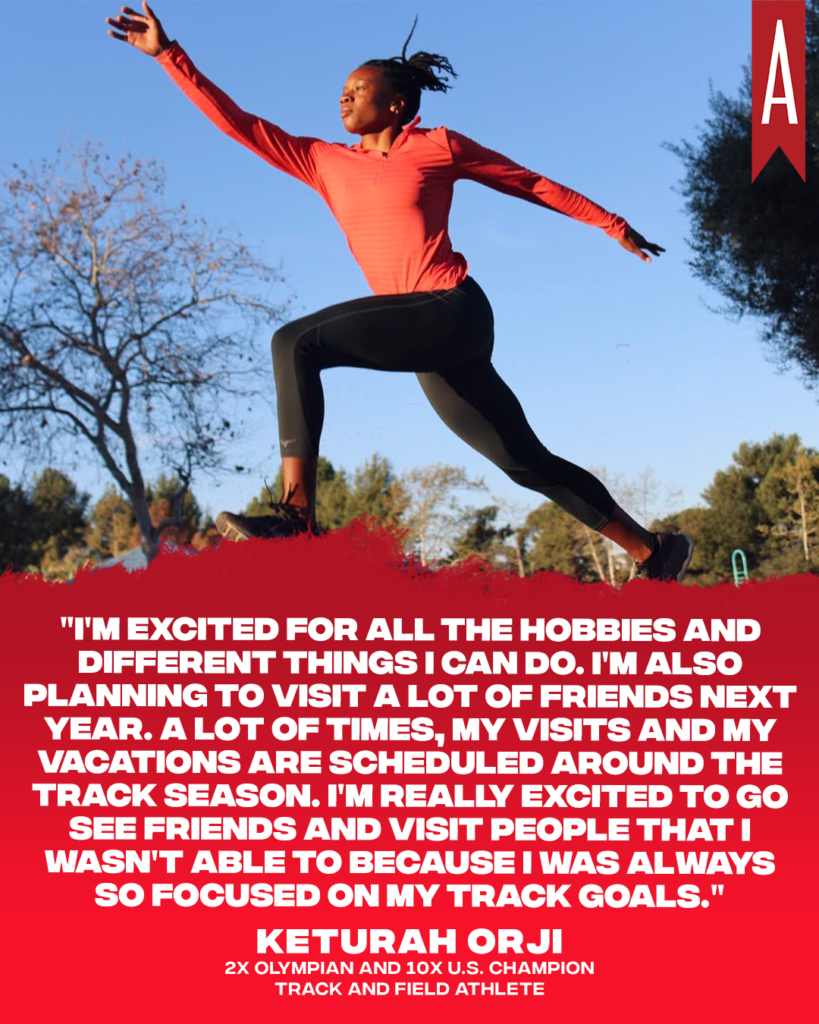
Her Agenda: Have you been able to help other athletes in certain ways?
Keturah Orji: Yeah, I think I have. I would say it’s probably less athletes and more just people in general, like my peers. They know that they can reach out to me with any questions. Even for people who are older it makes me really proud when people who are older than me ask questions because, in the world, age can be seen as, oh, the older you are, the wiser you are, the more you know. But when people five to 10 years older than me reach out to me and say, ‘Hey, what is the difference between [a] traditional IRA and a Roth IRA? What is one reason that I would or wouldn’t go with it?’ I love that I’m known as a person that they can reach out to and ask that question to and then be able to make a wise decision based on that information that they’re getting. So yeah, it’s an honor to be in this situation.
Her Agenda: What do you think life will look like after you’re done competing?
Keturah Orji: It’s funny you ask that because I’ve been trying to imagine it [but] it’s so hard thinking about what [I will] do physically to maintain muscle and the body type that I would like. Sport has been so much of a requirement. You come to practice, you do what the coach says, [and] you push your body through all this pain. I was trying to think of more fun, physical things [to do]. I really love double dutch, I’d love to get involved with some type of double dutching in Atlanta. I love volleyball, so if I can find some type of recreational volleyball to do, I’d love to do that. I’m still going to lift because I enjoy being strong. I have a part-time job at a financial planning company right now, so I’m still going to continue to be a financial planner, and then hopefully [I] can transition into full-time with the same company because I really enjoy that.
It’s kind of weird imagining it because track has been a part of my life for more than 10 years. So, thinking about the fact that I will not have to go to the track and will not have a structured workout is weird. But, I’m excited for all the hobbies and different things I can do. I’m also planning to visit a lot of friends next year. A lot of times, my visits and my vacations are scheduled around the track season. I’m really excited to go see friends [and] visit people that I wasn’t able to because I was always so focused on my track goals. So that’s going to be really nice, too.

Her Agenda: You’ve spoken about how you never wanted to be someone who was known as just an athlete. What are the steps that you’ve taken throughout your athletic career that have helped you make sure that you’re still a well-rounded person and not just an athlete?
Keturah Orji: I would say it started out first with my parents and just the way they raised us. My dad, being Nigerian, sport was never really at the top of his list of things. I always felt like my family valued me for my character and who I was, and it wasn’t always about track. [They were] never really fazed by that. Some people may hear that, and it sounds bad, but for me, it was freeing. I could go compete, and no matter how well or how bad I did, it really didn’t matter because I was going to come home and be Keturah. I really appreciated being raised in a home like that.
On top of that, when you’re in college, you still have to balance school with track. When you become a professional athlete, you can get sucked into, like, you are only an athlete. Everything you do revolves around track. I feel like what I did, and what I would encourage other athletes to do, is really just think about all the interests and everything that you have always been really drawn to and use your free time to do those things. It can be really easy to go to training, come home, chill, and then do it all again the next day. I would say use that free time to think about what [it is] that [you] want to do after track. If [you] got injured tomorrow and couldn’t do track anymore, what would [you] want to do? That’s how I really stuck with financial planning. That’s why I started writing [my] blog because these are things that I enjoy, and I’m not just a track athlete. If tomorrow I can’t do track anymore, there are still other interests and things that I would love to be a part of. I really just focused on trying to use my free time to still do those things that I enjoy.
Her Agenda: What is your motto?
Keturah Orji: My “K.O. The Comp” motto is: take leaps, no limits. Taking leaps is supposed to be specific to triple jump. But even in life, taking that leap of faith and not knowing how things may go, [or] whether you’re qualified for something or not, and going ahead and taking that leap. When you take those leaps, there’s no limit to what you can accomplish. I would say, even within track, my motto is God has not given me a spirit of fear but a spirit of power, which is a Bible verse. It calms my spirit and reminds me [that] what I have inside of me is not fearful; it’s powerful, and I can use that for my benefit.
[Editor’s note: This interview has been edited for length and clarity.]

